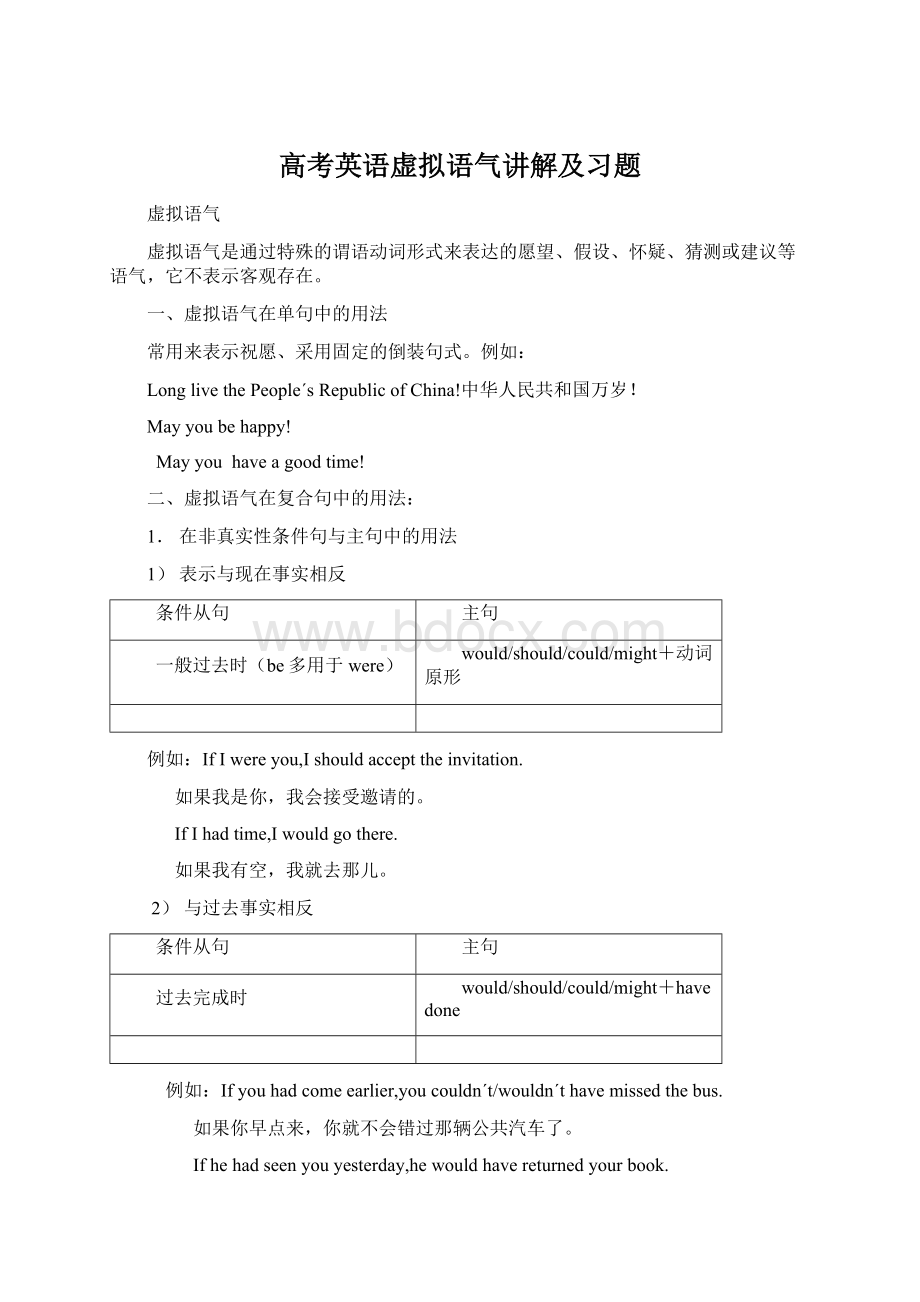高考英语虚拟语气讲解及习题.docx
《高考英语虚拟语气讲解及习题.docx》由会员分享,可在线阅读,更多相关《高考英语虚拟语气讲解及习题.docx(10页珍藏版)》请在冰豆网上搜索。

高考英语虚拟语气讲解及习题
虚拟语气
虚拟语气是通过特殊的谓语动词形式来表达的愿望、假设、怀疑、猜测或建议等语气,它不表示客观存在。
一、虚拟语气在单句中的用法
常用来表示祝愿、采用固定的倒装句式。
例如:
LonglivethePeople´sRepublicofChina!
中华人民共和国万岁!
Mayyoubehappy!
Mayyou haveagoodtime!
二、虚拟语气在复合句中的用法:
1.在非真实性条件句与主句中的用法
1)表示与现在事实相反
条件从句
主句
一般过去时(be多用于were)
would/should/could/might+动词原形
例如:
IfIwereyou,Ishouldaccepttheinvitation.
如果我是你,我会接受邀请的。
IfIhadtime,Iwouldgothere.
如果我有空,我就去那儿。
2)与过去事实相反
条件从句
主句
过去完成时
would/should/could/might+havedone
例如:
Ifyouhadcomeearlier,youcouldn´t/wouldn´thavemissedthebus.
如果你早点来,你就不会错过那辆公共汽车了。
Ifhehadseenyouyesterday,hewouldhavereturnedyourbook.
如果他昨天见到了你,他就会还你的书的。
3)与将来事实可能相反
条件从句
主句
一般过去时(be多用were)
shoulddo,weretodo
would/should/could/might+动词原形
例如:
Ifitshouldrain/weretorain/rainedtomorrow,thesportsmeetwouldbe
putoff.万一明天下雨,运动会就推迟。
(事实上明天下雨的可能性不大。
)
Ifyoudropped/shoulddrop/weretodroptheglass,itwouldbreak.
万一杯子掉下来会打碎的。
4)if的省略
如果条件句中有were,had,should等助动词,可将if省略,而把were,had或should
置于句首,来表达以if引导的条件句的相同意思。
例如:
Shoulditrain/wereittoraintomorrow,thesportsmeetwouldbeputoff./Hadheseenyouyesterday,hewouldhavereturnedyourbook.
5)条件句或主句的省略
当有上下文或上下句中的语言环境暗示的时候,表示虚拟语气的从句或主句往往可以省略,以避免重复。
例如:
——Whydidn´tyouattendthepartyyesterday?
——Iwould/shouldhave,butIwastoobusythen.
Iwassurprisedthatyoudidn´tlikethisjob.Youcouldhavedoneitbetter.(后面省略了ifyouhadlikedit.)
6)混合时间条件句与主句
条件句与主句的动作发生的时间有先后之差,应按各自动作时间搭配好相应的结构形式。
例如:
Iftheteacherhadn´tbeenillyesterday,whocouldgiveusalecturenow?
/Ifyouhadreviewedthelesson,youwouldanswerthequestionnow.
7)含蓄条件句与主句
即用without(=butfor),or(else)代替if从句。
例如:
Without/Butforhishelp,wewouldn´thavemadesuchgreatprogress.
=If wehadn´tgot hishelp,wewouldn´thavemadesuchgreatprogress.
2.在asif/asthough引导的状语从句中用法:
在asif/asthough引导的状语从句中,谓语动词多用倒退一个时间段的方式来表达虚拟语气。
例如:
Themanspeaksasifhewereaforeigner.
Thespeakertoldusalotaboutthatcountryasthoughhehadbeentheremanytimes
.Theytalkedasiftheyhadbeengoodfriendsforyears.
注:
asif/asthough从句中不一定都要用虚拟语气。
如果情况真实性、可能性很大,就要用正常时态来描绘。
例如:
Itlooksasifitisgoingtorain.天看起来象要下雨。
(下雨的可能性很大。
)
3.在宾语从句、表语从句、主语从句中的用法:
1)在wish后的宾语从句中的用法:
A.与过去事实相反的愿望:
宾从谓语为“haddone”形式。
例如:
IwishIhadpassedyesterday´sexam.要是我昨天的考试及格了该多好。
B.与现在事实相反的愿望:
宾从谓语为“did”形式。
例如:
Hewisheshewasascleverasyou./IwishIhadalargeroomtolivein.
C.表示将来愿望:
宾从谓语用“would/coulddo”形式。
例如:
HowIwishIwouldgoabroadnextyear!
2)在suggest,propose,demand,request,require,order,insist等动词后的宾语从句中,谓语为“(should)do”形式。
例如:
Isuggest/propose/demand/request/require/order/
insistthathe(should)besenttothenearesthospitalassoonaspossible.
3)在“Itis(about/high)time+that从句”结构中,that从句的谓语用一般过去时或“shoulddo”形式。
例如:
Itishightimehe started = Itishightimeheshouldstart
4)在表语从句、同位语从句中的用法:
在suggestion,proposal,request,requirement,
advice等名词后的表语从句、同位语从句中,谓语用“(should)do”形式。
例如:
Mysuggestionisthatwe(should)sendafewcomradestohelptheothergroups./Hegaveanorderthattheworkbedoneatonce.
虚拟语气考点分析
1.——Alice,whydidn´tyoucomeyesterday?
——I_____,butIhadanunexpectedvisitor. (NMET)
A.had B.would C.wasgoingto D.did
析:
此题A、D明显不合上下文,因为乙方没有去。
B选项若为wouldhave则成立,可以理解为IwouldhavecomeifIhadn´thadanunexpectedvisitor.的简略式。
但此处是would,故应排除。
只有wasgoingto可得体地表达“我原本打算去的,但是有不速之客造访”这一意思。
2.Iftherewerenosubjunctive,English______mucheasier. (NMET)
A.willbe B.wouldhavebeen C.couldhavebeen D.wouldbe
析:
观察题干,可知全句表达的是与现在事实相反的虚拟语气。
故答案为D。
3.Theguardatthegateinsistedthateverybody______therules. (NMET)
A.obeys B.obey C.willobey D.wouldobey
析:
根据insist后的宾语从句谓语要用(should)do形式规律,可定正确答案是B。
4.IwishI_____youyesterday.
A.seen B.didsee C.hadseen D.weretosee
析:
此题表与过去事实相反的原望,答案应为C。
5.——Ifhe_____,he_____thatfood.
——Luckilyhewassenttothehospitalimmediately. (NMET)
A.waswarned;wouldnottake B.hadbeenwarned;wouldnothavetaken
C.wuldbewarned;hadnottaken D.wouldhavebeenwarned;hadnottaken
析:
从对话看,是表达与过去事实相反的虚拟语气,故答案为B。
6.Withoutelectricityhumanlife_____quitedifferenttoday. (NMET)
A.is B.willbe C.wouldhavebeen D.wouldbe
析:
without引出一个含蓄条件句,主句表述的是与现在事实相反的虚拟语气,故答案为D。
7.Whenapencilispartlyinaglassofwater,itlookasifit_____. (NMET)
A.breaks B.hasbroken C.werebroken D.hadbeenbroken
析;放入水中的铅笔看上去是断的,但实际上并非如此,因此是与现在的事实相反,这时asif从句谓语要用一般过去时,故答案为C。
8.Youdidn´tletmedrive.Ifwe_____inturn,you_____sotired. (NMET)
A.drove;didn´tget B.drove;wouldn´tget
C.weredriving;wouldn´tget D.haddriven;wouldn´thavegot
析:
观察题干,可知if从句表述与过去事实相反的假设,因此答案只能是D。
9.Ididn´tseeyouruncleattheparty.Ifhe_____,hewouldhavesaidhelloto
me.
A.wouldcome B.hadcome C.came D.didcome
析:
观察题目上下文,特别是第二句的主句谓语为wouldhavesaid,可知if从句表述的是与过去事实相反的愿望,因此答案为B。
10._____it_____foryourhelp,Icouldn´thavemadeanyprogress.
A.Had;notbeen B.Should;notbe C.Did;notbe D.Not;be
析:
根据主句谓语形式,可知从句要用haddone形式,故应选A,Haditnotbeenforyourhelp=Ifithadnotbeenforyourhelp.(要不是你帮忙的话)
11.MrSmithwasbadlyill,orhe_____ourdinnerparty.
A.shouldcometo B.wouldhaveattended
C.wouldcometo D.shouldhaveattended
析:
or可引导含蓄条件句,表达虚拟语气。
根据此题内容,可知是与过去事实相反的假设,故答案为B。
1)概念
虚拟语气用来表示说话人的主观愿望或假想,所说的是一个条件,不一定是事实,或与事实相反。
2)在条件句中的应用
条件句可分为两类,一类为真实条件句,一类为非真实条件句。
非真实条件句表示的是假设的或实际可能性不大的情况,故采用虚拟语气。
1.真实条件句
真实条件句用于陈述语气,假设的情况可能发生,其中if是如果的意思。
时态关系
句型:
条件从句 主句
一般现在时shall/will+动词原形
Ifhecomes,hewillbringhisviolin.
典型例题
Thevolleyballmatchwillbeputoffifit___.
A. willrain B.rains C.rained D.israined
答案B。
真实条件句主句为将来时,从句用一般现在时。
注意:
1)在真实条件句中,主句不能用begoingto表示将来,该用shall,will.
(错)Ifyouleavenow,youarenevergoingtoregretit.
(对)Ifyouleavenow,youwillneverregretit.
2)表示真理时,主句谓语动词便不用shall(will)+动词原形,而直接用一般现在时的动词形式。
2.非真实条件句
1)时态:
可以表示过去,现在和将来的情况。
它的基本特点是时态退后。
a. 同现在事实相反的假设。
句型:
条件从句 主句
一般过去时 should(would)+动词原形
Iftheywerehere,theywouldhelpyou.
b. 表示于过去事实相反的假设。
句型:
条件从句 主句
过去完成时 should(would)have+过去分词
Ifshehadworkedharder,shewouldhavesucceeded.
Thericewouldnothavebeenburntifyouhadbeenmorecareful.
IfmylawyerhadbeenherelastSaturday,hewouldhavepreventedmefromgoing.
Ifhehadcomeyesterday,Ishould/wouldhavetoldhimaboutit.
含义:
Hedidnotcomeyesterday,soIdidnottellhimaboutit.
Ifhehadnotbeenillandmissedmanyclasses,hewouldhavemadegreaterprogress.
含义:
Hewasillandmissedmanylessons,sohedidnotmakegreaterprogress.
c. 表示对将来的假想
句型:
条件从句 主句
一般过去时 should+动词原形
were+不定式 would+动词原形
should+动词原形
Ifyousucceeded,everythingwouldbeallright.
Ifyoushouldsucceed,everythingwouldbeallright.
Ifyouweretosucceed,everythingwouldbeallright.
3.混合条件句
主句与从句的动作发生在不同的时间,这时主,从句谓语动词的虚拟语气形式因时间不同而不同,这叫做混合条件句。
Ifyouhadaskedhimyesterday,youwouldknowwhattodonow.
(从句与过去事实相反,主句与现在事实相反。
)
Ifithadrainedlastnight(过去),itwouldbeverycoldtoday(现在).
4.虚拟条件句的倒装
虚拟条件句的从句部分如果含有were,should,或had,可将if省略,再把were,should或had移到从句句首,实行倒装。
Weretheyherenow,theycouldhelpus.
=Iftheywereherenow,theycouldhelpus.
Hadyoucomeearlier,youwouldhavemethim
=Ifyouhadcomeearlier,youwouldhavemethim.
Shoulditrain,thecropswouldbesaved.
=Wereittorain,thecropswouldbesaved.
注意:
在虚拟语气的从句中,动词'be'的过去时态一律用"were",不用was,即在从句中be用were代替。
IfIwereyou,Iwouldgotolookforhim.
如果我是你,就会去找他。
Ifhewerehere,everythingwouldbeallright.
如果他在这儿,一切都会好的。
典型例题
_____todothework,Ishoulddoitsomeotherday.
A.IfwereIB.Iwere C.WereI D.WasI
答案C.在虚拟条件状语中如果有were,should,had这三个词,通常将if省略,主语提前,变成were,should,had+主语的形式。
但要注意,在虚拟条件状语从句中,省略连词的倒装形式的句首不能用动词的缩略形式。
如我们可说WereInottodo.,而不能说Weren'tItodo.
5.特殊的虚拟语气词:
should
1)Itisdemanded/necessary/apity+that…结构中的主语从句的谓语动词要用should加动词原形,should可省略。
句型:
(1)suggested
Itis
(2)important that…+(should)do
(3)apity
(1)suggested,ordered,proposed,required, demanded,requested,insisted;+(should)do
(2)important,necessary,natural,strange
apity, ashame, nowonder
(3)Itissuggestedthatwe(should)holdameetingnextweek.
Itisnecessarythathe(should)cometoourmeetingtomorrow.
2)在宾语从句中的应用
在表示命令、建议、要求等一类动词后面的从句中。
order,suggest,propose,require,demand,request,insist,command,insist+(should)do
Isuggestthatwe(should)holdameetingnextweek.
Heinsistedthathe(should)besentthere.
注意:
如suggest,insist不表示"建议"或"坚持要某人做某事时",即它们用于其本意"暗示、表明"、"坚持认为"时,宾语从句用陈述语气。
Theguardatgateinsistedthateverybodyobeytherules.
判断改错:
(错) Youpalefacesuggeststhatyou(should)beill.
(对) Yourpalefacesuggeststhatyouareill.
(错) Iinsistedthatyou(should)bewrong.
(对) Iinsistedthatyouwerewrong.
3)在表语从句,同位语从句中的应用
在suggestion,proposal,idea,plan,order,advice等名词后面的表语从句、同位语从句中要用虚拟语气,即(should)+动词原形。
Myideaisthatwe(should)getmorepeopletoattendtheconference.
Imakeaproposalthatwe(should)holdameetingnextweek.
6.wish的用法
1)用于wish后面的从句,表示与事实相反的情况,或表示将来不太可能实现的愿望。
其宾语从句的动词形式为:
真实状况 wish后
从句动作先于主句动词动作 现在时 过去时
(be的过去式为were)
从句动作与主句动作同时发生 过去时 过去完成时
(had+过去分词)